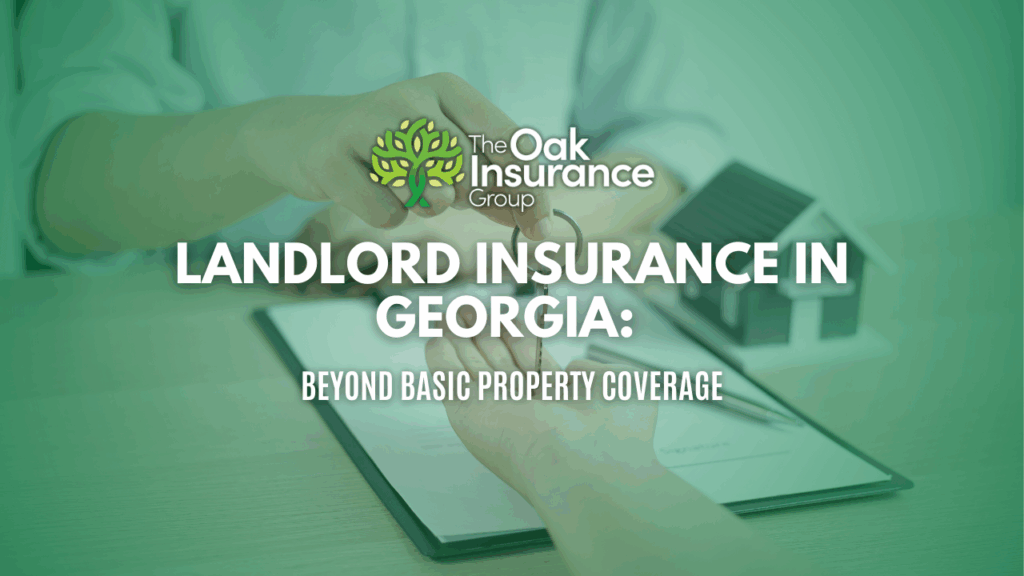
Do you own rental property in Georgia and wonder if your current insurance really covers everything you need?
Are you aware that standard homeowners policies often leave massive gaps when it comes to protecting your rental income and legal liability as a landlord?
In this article, you’ll learn exactly what landlord insurance covers in Georgia—and more importantly, what it doesn’t. We’ll break down the essential protections, explore advanced coverage options, and reveal smart ways to future-proof your real estate investment.
You’ll discover:
- The key differences between landlord and homeowners insurance
- Core coverages every Georgia landlord needs
- Advanced protections for income loss, legal issues, and weather risks
- How to choose the right policy limits for your portfolio
Let’s dive in.
Why Georgia Landlords Need More Than Homeowners Insurance
If you’re a property owner in Georgia, you face unique risks—from weather disasters to tenant-related damages—that standard homeowners insurance won’t touch.
Landlord insurance is designed to protect your income-producing property. It covers scenarios that homeowners policies exclude, including:
- Tenant-caused damage
- Legal liability from third-party injuries
- Lost rental income due to property damage
While Georgia law doesn’t mandate landlord insurance, mortgage lenders usually require it—and even if you own the property outright, skipping it is a risky gamble.
Core Landlord Insurance Coverages Every Georgia Investor Needs
Dwelling Coverage
This protects the physical structure of your rental property from perils like fire, wind, hail, and vandalism.
In a state like Georgia—hit by 130+ major weather disasters since 1980—solid dwelling protection is non-negotiable.
Other Structures Coverage
Covers detached property features such as garages, sheds, and fences.
Most policies extend this protection up to 100% of your dwelling coverage limit, ensuring full asset protection.
Landlord Liability Coverage
Protects you if a tenant or visitor is injured or if you’re held legally responsible for property damage.
With legal claims often exceeding six figures, this is crucial for shielding your personal assets.
Beyond the Basics: Advanced Coverage That Pays Off
Fair Rental Value Coverage
Replaces lost income when your property becomes uninhabitable due to a covered event.
If your $300,000 rental earns $2,000/month and suffers fire damage, this coverage could replace $6,000 in lost rent over three months of repairs.
Vandalism & Tenant Damage Protection
Georgia policies often cover vandalism up to $100,000, but not all tenant-caused damage qualifies.
Check whether your policy excludes intentional tenant damage or has vague language around coverage.
Legal and Eviction Fee Reimbursement
Some insurers now offer legal cost coverage for evictions or disputes—a smart addition in Georgia, where landlord-tenant laws can create costly legal battles.
Ordinance & Law Coverage
Covers required code upgrades after a covered loss—essential for older Georgia properties facing modern compliance hurdles.
Amplify Your Liability Shield
Umbrella Insurance for Landlords
Affordable, high-limit liability protection that supplements your base policy.
Starting at a few hundred dollars annually, it’s ideal for landlords with multiple properties or high net worth.
Important: Umbrella coverage must sit on top of a valid landlord policy—not a homeowners policy.
Enhanced Liability Limits
Most landlords carry $1 million in liability. If you own multiple units or high-value properties, increase this limit to match your exposure.
Georgia-Specific Risks: Weather, Water, and Vacancy
Flood Insurance
Standard landlord insurance does not cover flooding.
Whether or not your property is in a floodplain, Georgia landlords can purchase flood protection via the National Flood Insurance Program (NFIP) or private insurers.
Water Backup Coverage
Heavy rains and old infrastructure make sewer backups a real risk.
Add water backup protection to avoid footing the bill for water damage and removal.
Vacancy Coverage
If your property is empty for more than 30-60 days, you may lose coverage unless you buy a vacancy endorsement or a separate policy.
Don’t Overlook Business Income Protection
Enhanced Loss of Income Coverage
Goes beyond rent replacement to cover continuing expenses like mortgage payments, taxes, and utilities during downtime.
This can protect your bottom line even when your property isn’t generating income.
Legal & Compliance Shields You Didn’t Know You Needed
Fair Housing Defense
Some enhanced policies cover legal fees if you’re sued under Georgia’s Fair Housing laws.
This coverage is essential in today’s compliance-focused environment.
Commercial Property Coverage
If you manage properties as a business or under an LLC, you may need a commercial policy, not just landlord insurance.
Choosing the Right Coverage Levels
Replacement Cost vs. Actual Cash Value
Always insure for full replacement cost.
Underinsuring can lead to coinsurance penalties and out-of-pocket losses, especially given rising construction costs in Georgia.
Smart Deductible Planning
Higher deductibles lower premiums, but make sure you can cover them during a claim.
Liability and Asset Review
Calculate your total exposure—including personal savings and other properties—to set appropriate liability limits.
Partnering with the Right Insurance Professional
Independent Agents vs. Direct Writers
Independent agents offer policy comparisons from multiple carriers—giving you better pricing and broader coverage options.
Annual Coverage Reviews
As your portfolio grows, your risks change. Review your policy annually to avoid gaps in protection.
Budgeting: What Landlord Insurance Costs in Georgia
Expect to pay about 25% more than a standard homeowners policy, averaging $1,275 per year.
Premiums vary based on:
- Property age and construction
- Location and disaster history
- Coverage limits and deductible
- Claims and credit history
- Number of properties insured
Conclusion: Don’t Just Insure—Invest in Your Property’s Future
At the end of the day, owning rental property in Georgia can be highly profitable—but only if you protect your investment comprehensively.
While standard coverage may seem sufficient at first glance, the true risks landlords face go far beyond fire or theft.
Now that you’ve learned exactly what landlord insurance in Georgia should include, it’s time to review your current policy, identify gaps, and speak with an expert who understands your market.
Your next step? Talk to a knowledgeable insurance professional and get a quote tailored to your properties and portfolio goals.
Don’t let a missing policy clause be the reason your investment dreams go up in smoke.

